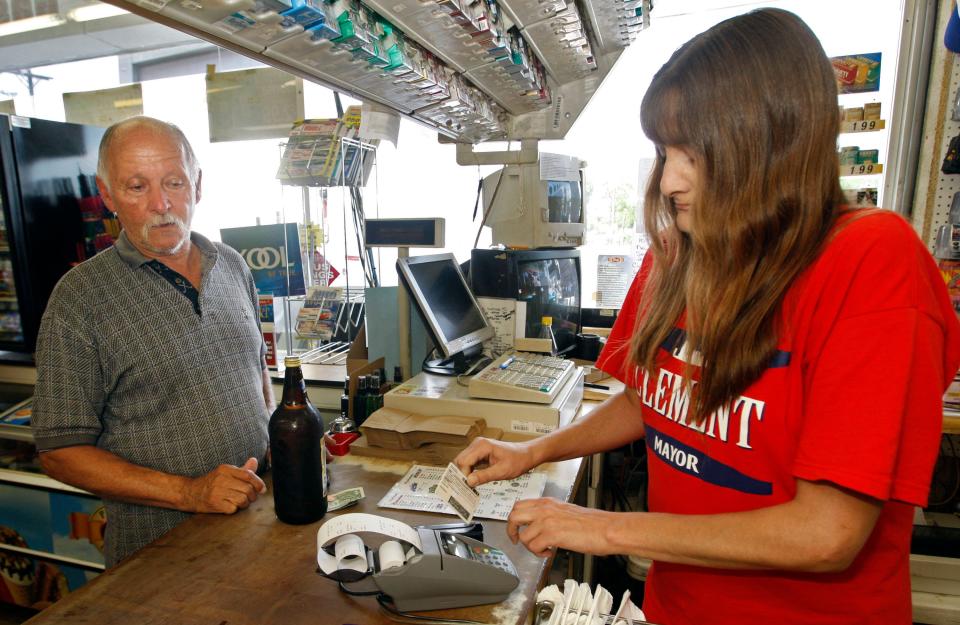Alachua County leaders look to shame businesses that sell tobacco products to underage smokers
Alachua County officials are venting their frustration at the state for stripping its authority to inspect and penalize businesses that illegally sell tobacco to people under 21 years old.
With few options left, leaders say they want to shame those businesses.
But compiling a comprehensive list of offenders may prove challenging, as a running county-funded sting operation has been halted due to new state law.
"We’ve lost total local control,” said Missy Daniels, the county's growth management director, who previously ran the county's underage tobacco sales enforcement program.

Taking lives: Like big tobacco, auto industry spins lies as it takes lives
Medical marijuana: Major medical marijuana distributor Trulieve to close Alachua County grow facility
Fix the streets: Stop making excuses for pedestrian deaths and fix the streets
In Alachua County, the legal age to buy tobacco-related products was raised to 21 in 2019, an effort intended to curb minors from smoking. But last year, the state Legislature preempted counties and cities from regulating tobacco sales, even though the minimum age to purchase tobacco in the state was also raised to 21.
Since the new law, county officials say enforcement of underage tobacco sales by the Food and Drug Administration has been almost nonexistent.
Through Feb. 28, there have been just nine FDA inspections for underage tobacco sales in Gainesville since 2015, with the last one being in 2019, the FDA's website says.
Of the businesses that were inspected, only seven received warning letters. And only two businesses — the Dollar General Store at 145 NE 39th Ave. in Gainesville and the Sunoco store at 4207 NW 13th St. in Gainesville — have received fines for undisclosed amounts.
County Commissioner Mary Alford said the small number of inspections is unacceptable.
“The health and welfare of Alachua County citizens is my job,” she said. “We need to rack up enforcement any way we can, even if it’s not enforcement but deterrence.”
Alford said she is inquiring about the legality of the county providing grant money to Tobacco Free Alachua to renew the sting operations. That organization would hire minors to go into county businesses to try to buy tobacco as they did when the county was regulating sales, she said.
Even though the county could not punish the violators, the list of businesses in violation could be published and serve as a deterrent when selling to minors, Alford said.
“Nobody from staff has told me yet we can’t do this," she said.
Stores that failed county inspections, which were handled by ISN Corp. out of Maryland that hired minors to try and purchase tobacco, were penalized by having their county license to sell tobacco suspended. The penalty duration escalated for repeat offenses.
Between Feb. 10, 2020 and April 29, 2021, the county program sent minors into 158 stores to buy tobacco products, discovering more than 50 violations, according to county reports.
“We had active citations,” Alford said. “The eastside Walmart store had a 100 percent fail rate on selling to minors for example.”
Wendy Resnick, a volunteer with Tobacco Free Alachua, said the state’s preemption has significantly curtailed enforcement.
“When Alachua had its program, the goal was to do surveillance of every single retailer that sold tobacco in the county once a year,” she said.
The coronavirus pandemic slowed those hopes. But for those inspected, 30% sold to minors.
She believes the Florida Division of Alcoholic Beverages and Tobacco doesn't take the issue seriously.
“They tend to focus on compliance, like loose cigarettes that are not licensed," she said.
Andrew Romero, who was a staff person for the Department of Health that supported the Tobacco-Free Alachua Coalition, said state laws on tobacco "are usually weak."
“The state wants to collect tax revenue from tobacco retailers, so they don’t really have any incentive to up the penalties and take away people's licenses because those are how they collected tax revenue," he said.
When Alachua County had a program enforcing tobacco sales laws to underage smokers, the license fees covered the cost of the program.
“It is important that these enforcement programs pay for themselves and don’t divert money away from other prevention efforts,” Romero said.
He also said it is clear from the FDA figures that there are not enough compliance checks happening now, and when businesses are found to be selling tobacco to minors, they only receive a minor fine.
"Merchants just sort of build in the cost of these fines into their marketing budget it is so low," Romero said.
The issue is crucial to the well-being and public's overall health, says Ramzi Salloum, an associate professor at the University of Florida College of Medicine.
“When it comes to minors, this shouldn’t be controversial," he said. "There is plenty of evidence that a big chunk of high school students are getting their e-cigarettes from convenience stores and vape shops.”
Salloum also added there is some evidence that minorities are disproportionately affected when underage tobacco sales laws are not enforced.
“We have evidence of gas stations and tobacco shops having a higher concentration in areas where minorities live,” he said.
This article originally appeared on The Gainesville Sun: Alachua officials fret over businesses selling tobacco to minors

